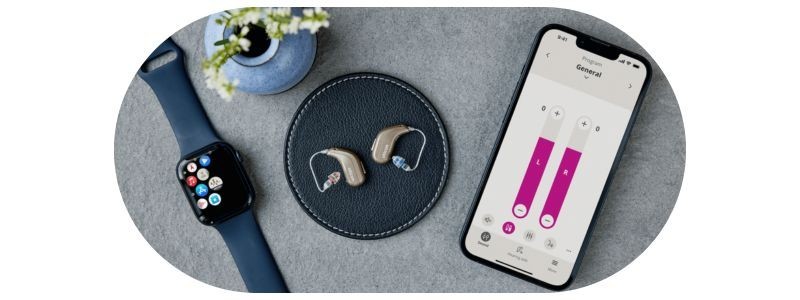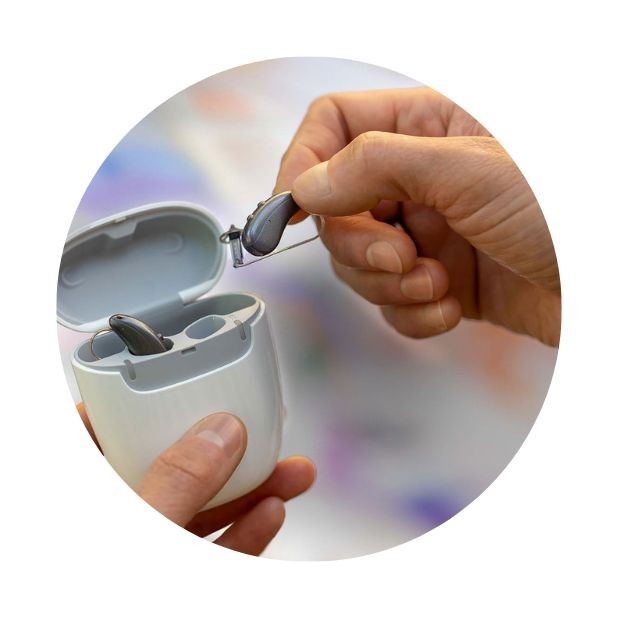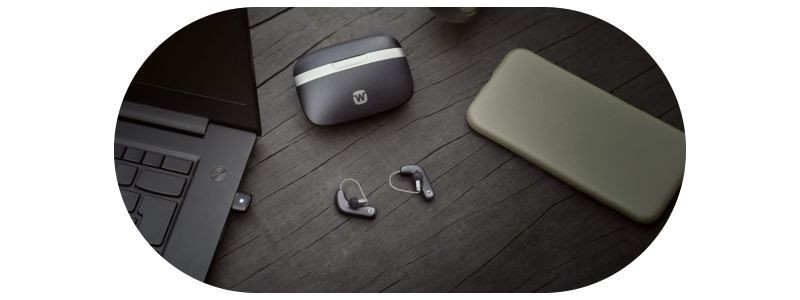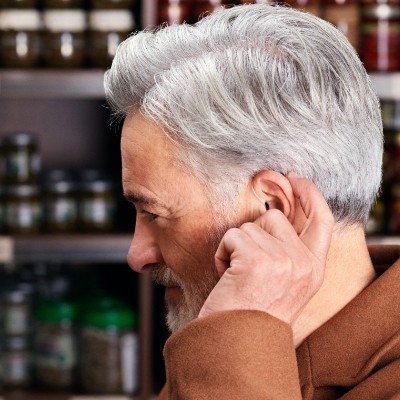Free home visits
with a local audiologist

There are plenty of benefits to local hearing aid services. Discovering local hearing aid services can be a game-changer for those seeking to address their hearing impairment effectively.
Local hearing aid providers offer a range of invaluable benefits, from personalised care and face-to-face consultations to prompt support and follow-up services.
Here, we delve into the numerous advantages of choosing local hearing aid professionals.
From the convenience of accessible appointments to the familiarity with local audiological nuances, local hearing aid providers can offer tailored solutions that go beyond mere device selection.

A while back, we published an article about Family Centred Care and how important it is during the patient's hearing loss journey. Understanding that all hearing loss is different and, therefore, should be treated as such.
We also talked about our experiences in the value of building trust and relatability with our patients, along with their families.
Here we discuss the role of the audiologist, the patient, and the professional relationship between the two. Choosing to focus on not just the technical aspects of appointments and hearing health, but on connecting and building a rapport with patients.
Ensuring that they leave completely happy with their digital hearing aids, the fit, the service, and their future healthcare plan. As well as being well-equipped to self-manage their hearing loss and maintain their hearing aids successfully.

Researching and educating yourself are important. You might be looking for the "best hearing aid providers near me" or "hearing aid dispensers near me" - either was,y before purchasing anything, look at the reviews and experiences that other people have had with each provider.
Researching what hearing aids are available and where you can source your hearing healthcare locally is so important at the beginning. However, the right audiologist will make all the difference to your hearing loss journey and hearing healthcare future - so it's important to get it right.
The right audiologist will use the patient-centred approach to hearing healthcare. They will treat you less like a number and more like a person, as well as attend to your own unique hearing loss.
What is the patient-centered approach in regards to hearing healthcare? In brief, it is when patient preferences guide the decision-making process. When an audiologist fully understands the patient's needs and specifications, they can better inform and educate them and their families.
This could be about treatment options available and tailoring the information to suit the patient's worries and healthcare expectations.
What should you look out for when searching for the right audiologist? The patient-centered care approach is the difference, and a true audiologist has this in bundles. A professional who can think past the devices themselves can empower those with hearing loss.
A good audiologist understands that audiology appointments can be overwhelming for a patient because of the amount of information shared. With this in mind, they would dedicate the right amount of time to each of the appointments to cater to this.

Good communication is key when looking for the right audiologist. In life, we always say that first impressions are the most important and it is no different in the audiology industry. The first point of call with your audiologist is the same, and great communication is vital.
Communication ‘best practices' have evolved and the audiologists of today should have access to tools to better communicate with their patients, and this should be their main priority.
For example, spending time counselling in each appointment in areas such as the skills to hear better, communicate better, and live better. It’s the little things that can make a big difference in beneficial communication between you and your audiologist.
A good audiologist will provide you with a set of tools that you can access to help manage your hearing loss successfully. Tools that are unique to your priorities and communication hurdles.

Whilst finding the right hearing solution for you is the biggest challenge when embarking on your hearing loss journey – knowing all aspects of hearing healthcare will help you make more informed choices, individually or with your family, that are right for your hearing loss needs.
It is important to know that one very understated benefit of having a local independent hearing aid audiologist, like the professionals we provide, rather than a national retailer, is the continuity of service. National companies employ dispensers usually on a salary plus commission basis.
These dispensers typically move from one company to another as the 'grass gets greener' elsewhere. This means that your hearing aid audiologist will probably change over the life of your hearing aids.
With an independent business, the hearing aid audiologist usually only changes when someone retires, so you can expect a better and more consistent continuity of service.

Finding the right independent hearing aid provider is easier than you think. An audiologist who welcomes and gets your family involved means you can share decisions and feel less burdened.
It will also educate your family on knowing the true effects of hearing loss and how they can help you going forward. Other skills to look out for are:

Having a hearing aid provider nearby offers convenience in terms of scheduling appointments, receiving timely assistance, and accessing follow-up care.
This locality makes it easier to address any concerns or issues promptly, leading to better outcomes for your hearing health. Local providers understand the unique audiological needs of the community and can offer tailored solutions.
They often offer prompt support, quick adjustments, and ongoing assistance, ensuring optimal hearing aid performance. Building a lasting relationship with a local provider creates trust and reliability, enhancing the overall quality of the hearing care experience.
These benefits make opting for local hearing aid services a wise choice for those seeking effective solutions for hearing loss.

At Hearing Aid UK, we always put the patient first. Wherever you live, we will have around 2-3 independent local audiologists available.
We offer a full and completely free home visiting service for all your hearing loss needs. Due to our coverage being nationwide, we can offer all our patients this convenient service.
Our audiologists will plan, advise, and support you through your hearing journey with the right hearing solution.
They will also arrange any future check-ups, maintenance visits, adjustments, and annual hearing tests so you don't have to manage your appointments.
 Specsavers vs Amplifon: What are the differences?
Specsavers vs Amplifon: What are the differences?  Switching to a New Hearing Aid Provider
Switching to a New Hearing Aid Provider  Boots Hearingcare vs Hidden Hearing: What's the difference between the two?
Boots Hearingcare vs Hidden Hearing: What's the difference between the two? Do not spend hundreds of pounds without getting a second opinion from us.
 Not only are the prices great, but the service is fantastic! Many thanks to your team.
Not only are the prices great, but the service is fantastic! Many thanks to your team.If you are looking at this page then it is likely that an audiologist has suggested that you purchase this particular hearing aid, so is this the best model for you?
In general, any audiologist will always recommend to you the model that best suits your needs. Here is a useful checklist to make sure that is the case.
If in doubt, feel free to give us a call. That's what we're here for. In the meantime, read all about our review of the best hearing aids for 2025 here
If you have significant hearing loss in both ears, you should be wearing two hearing aids. Here are the audiological reasons why:
Localisation: The brain decodes information from both ears and compares and contrasts them. By analysing the minuscule time delays as well as the difference in the loudness of each sound reaching the ears, the person is able to accurately locate a sound source. Simply put, if you have better hearing on one side than the other, you can't accurately tell what direction sounds are coming from.
Less amplification is required: A phenomenon known as “binaural summation” means that the hearing aids can be set at a lower and more natural volume setting than if you wore only one hearing aid.
Head shadow effect: High frequencies, the part of your hearing that gives clarity and meaning to speech sounds, cannot bend around your head. Only low frequencies can. Therefore if someone is talking on your unaided side you are likely to hear that they are speaking, but be unable to tell what they have said.
Noise reduction: The brain has its own built-in noise reduction which is only really effective when it is receiving information from both ears. If only one ear is aided, even with the best hearing aid in the world, it will be difficult for you to hear in background noise as your brain is trying to retain all of the sounds (including background noise) rather than filtering it out.
Sound quality: We are designed to hear in stereo. Only hearing from one side sounds a lot less natural to us.
Fancy some further reading on this topic? You can read about why two hearing aids are better than one in our article, hearing aids for both ears, here
For most people, the main benefit of a rechargeable hearing aid is simple convenience. We are used to plugging in our phones and other devices overnight for them to charge up. Here are some other pros and cons:
For anybody with poor dexterity or issues with their fingers, having a rechargeable aid makes a huge difference as normal hearing aid batteries are quite small and some people find them fiddly to change.
One downside is that if you forget to charge your hearing aid, then it is a problem that can't be instantly fixed. For most a 30-minute charge will get you at least two or three hours of hearing, but if you are the type of person who is likely to forget to plug them in regularly then you're probably better off with standard batteries.
Rechargeable aids are also a little bit bigger and are only available in Behind the Ear models.
Finally, just like with a mobile phone, the amount of charge you get on day one is not going to be the same as you get a few years down the line. Be sure to ask what the policy is with the manufacturer warranty when it comes to replacing the battery.
Looking for more information on rechargeable hearing aids? Read our dedicated page on the topic here
For most people, the answer is yes. But it's never that simple.
The majority of hearing problems affect the high frequencies a lot more than the low ones. Therefore open fitting hearing aids sound a lot more natural and ones that block your ears up can make your own voice sound like you are talking with your head in a bucket. Therefore in-ear aids tend to be less natural.
However the true answer is we can't tell until we have had a look in your ears to assess the size of your ear canal, and until we have tested your hearing to see which frequencies are being affected.
People with wider ear canals tend to have more flexibility, also there are open fitting modular CIC hearing aids now that do not block your ears.
There is also the age old rule to consider, that a hearing aid will not help you if it's sat in the drawer gathering dust. If the only hearing aid you would be happy wearing is one that people can't see, then that's what you should get.
Most people can adapt to any type of hearing aid, as long as they know what to expect. Have an honest conversation with your audiologist as to what your needs are.
Generally speaking, six or more. Unless it's none at all.
The number of channels a hearing aid has is often a simplistic way an audiologist will use to explain why one hearing aid is better than another, but channels are complex and it is really not that straightforward. Here are some reasons why:
Hearing aids amplify sounds of different frequencies by different amounts. Most people have lost more high frequencies than low and therefore need more amplification in the high frequencies. The range of sounds you hear are split into frequency bands or channels and the hearing aids are set to provide the right amount of hearing at each frequency level.
Less than six channels and this cannot be done with much accuracy, so six is the magic number. However, a six channel aid is typically very basic with few other features and is suitable only for hearing a single speaker in a quiet room. The number of channels is not what you should be looking at, it's more the rest of the technology that comes with them.
As a final note, different manufacturers have different approaches. One method is not necessarily better than any other. For example, some manufacturers have as many as 64 channels in their top aids. Most tend to have between 17 and 20. One manufacturer has no channels at all.
Hearing aids are easily lost, misplaced or damaged and typically are one of the most expensive personal possessions an individual can own. We offer hearing aid warranty coverage for £80 per year per aid. Find out more about this service we provide here
All our audiologists use the very latest technology and provide the full range of tests to accurately measure your hearing for free. Find out about what hearing healthcare services we offer all our customers here
Hearing Aid UK offers all their customers free home visiting services, even in a care home environment, for no extra cost. Including hearing tests, fittings, maintenance, check-ups and much more in the comfort of your own home and at your convenience. Find out more information about our home visits here
Here, at Hearing Aid UK, we are dedicated to offering low hearing aid prices. We achieve this by having no head office and low marketing costs. Our hearing aid prices are amongst the lowest you will find anywhere in the world. Explore our prices, brands, and models here
When we refer to a product as 'Latest Launch', we mean it is the latest to be released on the market.
When we refer to a product as 'New', we mean that the product is the newest hearing aid model on the market.
When we refer to a product as 'Superseded', we mean that there is a newer range available which replaces and improves on this product.
When we refer to a product as an 'Older Model', we mean that it is has been superseded by at least two more recent hearing aid ranges.